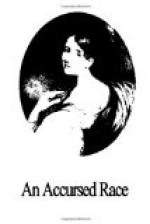But this medical report of Dr. Guyon’s—bringing facts and arguments to confirm his opinion, that there was no physical reason why the Cagots should not be received on terms of social equality by the rest of the world—did no more for his clients than the legal decrees promulgated two centuries before had done. The French proved the truth of the saying in Hudibras—
He that’s convinced against
his will
Is of the same opinion still.
And, indeed, the being convinced by Dr. Guyon that they ought to receive Cagots as fellow-creatures, only made them more rabid in declaring that they would not. One or two little occurrences which are recorded, show that the bitterness of the repugnance to the Cagots was in full force at the time just preceding the first French revolution. There was a M. d’Abedos, the curate of Lourbes, and brother to the seigneur of the neighbouring castle, who was living in seventeen hundred and eighty; he was well-educated for the time, a travelled man, and sensible and moderate in all respects but that of his abhorrence of the Cagots: he would insult them from the very altar, calling out to them, as they stood afar off, “Oh! ye Cagots, damned for evermore!” One day, a half-blind Cagot stumbled and touched the censer borne before this Abbe de Lourbes. He was immediately turned out of the church, and forbidden ever to re-enter it. One does not know how to account for the fact, that the very brother of this bigoted abbe, the seigneur of the village, went and married a Cagot girl; but so it was, and the abbe brought a legal process against him, and had his estates taken from him, solely on account of his marriage, which reduced him to the condition of a Cagot, against whom the old law was still in force. The descendants of this Seigneur de Lourbes are simple peasants at this very day, working on the lands which belonged to their grandfather.
This prejudice against mixed marriages remained prevalent until very lately. The tradition of the Cagot descent lingered among the people, long after the laws against the accursed race were abolished. A Breton girl, within the last few years, having two lovers each of reputed Cagot descent, employed a notary to examine their pedigrees, and see which of the two had least Cagot in him; and to that one she gave her hand. In Brittany the prejudice seems to have been more virulent than anywhere else. M. Emile Souvestre records proofs of the hatred borne to them in Brittany so recently as in eighteen hundred and thirty-five. Just lately a baker at Hennebon, having married a girl of Cagot descent, lost all his custom. The godfather and godmother of a Cagot child became Cagots themselves by the Breton laws, unless, indeed, the poor little baby died before attaining a certain number of days. They had to eat the butchers’ meat condemned as unhealthy; but, for some unknown reason, they were considered to have a right to every cut leaf turned upside down, with




